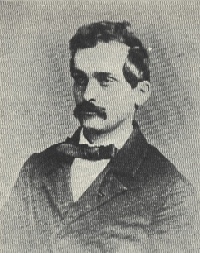Dan Emmett (1815-1904)
 Daniel Decatur Emmett was born in Mount Vernon, Ohio, on October 29, 1815. Like many others that were to populate the early minstrelsy circuit, Emmett came from an Irish-American family. His grandfather, John Emmett came to America from Ireland sometime before the revolutionary war where he served as a surgeon and chaplain. In 1788 he had a son, Abraham who lived in Vriginia with his family until coming to Mount Vernon, Ohio in around 1812 and was among its earliest settlers.
Daniel Decatur Emmett was born in Mount Vernon, Ohio, on October 29, 1815. Like many others that were to populate the early minstrelsy circuit, Emmett came from an Irish-American family. His grandfather, John Emmett came to America from Ireland sometime before the revolutionary war where he served as a surgeon and chaplain. In 1788 he had a son, Abraham who lived in Vriginia with his family until coming to Mount Vernon, Ohio in around 1812 and was among its earliest settlers.
Not much is known about Emmett's early childhood except that in his old age he recalled that as a youth "it was a fashion in those days among the young people to try their skill at making verses, and sing them to some popular tune." Most of the tunes which impressed Emmett were of Irish, Scottish or English origin, with some early American Negro minstrel music. At age fifteen he had written and performed his first original composition at an 1830 Fourth of July celebration. This song is still a popular song today called "Old Dan Tucker."
At seventeen Emmett left home and joined the U.S. Army, becoming the lead fifer at Jefferson Barracks, Missouri. When the Army found out he lied about his age he was dismissed. The next few years he would sign on with various circus bands and continued to perform in public. In 1842 Emmett joined the Original Virginia Minstrels where he played fiddle. It was an immediate success and their act was being copied all over the country. They even did a tour in Great Britain. Unfortunately the group soon went there separate ways.
Upon returning to the States he dabbled in acting and managing minstrel shows but he belonged on the stage. His main instrument throughout his years was the banjo. Emmett joined Bryant's Minstrels in New York in 1858 where he stayed and worked until 1867. From 1867 to 1888 he lived in Chicago once again plying his stagecraft of song accompanying himself on the fiddle and the banjo.
In 1859 Emmett wrote the song which would make him famous. "Dixie's Land," which was eventually shortened to "Dixie," became a smash hit. It was written as a walkaround, which is a section of the show during which each performer walked several times around the inside of a semicircle in which his fellow performers were seated and then did his particular specialty in the center of the stage. With the Civil War impending the South picked up "Dixie" as its unofficial confederate anthem. Emmett, being a Unionist was not happy about this at all. Even today "Dixie" can bring up controversy. Schools, plays and States have all been litigated against for usage of this song, claiming its offensive in one form or another. After the war "Dixie" regained its popularity in the North.
By 1882 Emmett, now in his sixties, was still touring and would sing his famous song "Dixie" to standing ovations. He toured with the Leavitt Gigantean Minstrels in the 1880's and in 1895, at the age of eighty, he took his last tour with Al Field's troupe, mostly touring through the South. He returned to Mount Vernon in 1888 where he lived the last years of his life.
Like most entertainers in those days Emmett retired penniless. He would chop and saw wood for farmers to put a meal on his table. Upon finding out of his situation in 1893 the Actor's Fund of America in New York City granted him a weekly sum of five dollars a week. He lived on this until he died on June 28, 1904. He was always considered a local celebrity and this small community still honors his life with various events and lectures. A monument has been erected in his honor and his birthplace is now a historic landmark.
Besides Old Dan Tucker and Dixie, other famous songs credited to Emmet are "Turkey in the Straw," "Old Zip Coon," "The Blue Tail Fly," and "De Boatman's Dance." In 1943 Bing Crosby played Dan Emmett in the film-story of his life called, of course, Dixie.